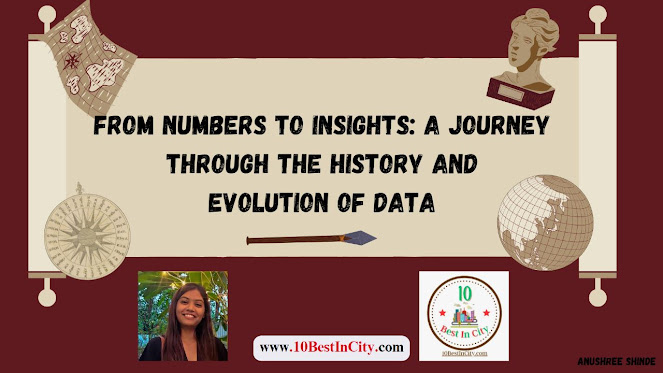From Numbers to Insights: A Journey through the History and Evolution of Data
A fascinating journey spanning centuries and including numerous academic disciplines and technical developments is the history and evolution of data. Data has been an integral part of human civilisation from early mathematical systems to the sophisticated data analytics of today. Let's travel back in time to examine the major turning points and evolutions in the data universe.
Early Numerical Systems:
Early civilizations laid the foundation for both numerical systems and the concept of numbers. The earliest numeral systems were developed by the Sumerians, Egyptians, and Indus Valley Civilization around 3000 BCE. These systems provided the framework for expressing amounts and performing basic arithmetic operations.
Statistical Data in Ancient Times:
Many ancient civilizations used data collecting and processing for statistical objectives. The ancient Egyptians, for instance, collected information on agricultural output, population counts, and other administrative records. In order to collect taxes, the Chinese started conducting censuses as early as the Han Dynasty (206 BCE–220 CE).
Development of Probability Theory:
The study of probability became a field of mathematics in the 17th century. Blaise Pascal and Pierre de Fermat were two mathematicians who made substantial contributions to the growth of probability theory, which established a framework for examining ambiguous events and developing data-based predictions.
Birth of Modern Statistics:
The development of contemporary statistics started in the 18th and 19th centuries. The foundation for statistical techniques and methodologies, such as regression analysis, hypothesis testing, and the idea of correlation, was laid by statisticians like Sir Francis Galton, Karl Pearson, and Ronald Fisher.
Early Computing and Data Processing:
The development of computing and data processing began in the early 20th century. Data processing was revolutionised by pioneers like Herman Hollerith and his punch-card tabulation devices, particularly in the fields of census taking and statistical analysis.
Advent of Computers and Databases:
In terms of data processing and analysis, the introduction of electronic computers in the middle of the 20th century was a crucial turning point. The storage, retrieval, and manipulation of enormous volumes of data were made possible by computers. With the advent of databases, structured data storage and organisation became possible.
Data Warehousing and Business Intelligence:
Data warehousing as a notion first appeared in the 1970s. To support decision-making processes, businesses started to gather and retain vast amounts of data from numerous sources. Insights gained from data may now be used to inform corporate plans, thanks to the development of business intelligence tools and technology in the 1980s and 1990s.
Big Data and Data Science:
The field of big data was created by the exponential growth of data in the digital era. Huge amounts of organised and unstructured data become available for analysis with the growth of the internet, social media, and sensors. Data scientists and analysts started using cutting-edge methods like artificial intelligence and machine learning to glean valuable insights from massive data.
Data Visualization and Storytelling:
Effective data visualisation and storytelling became more and more essential as data grew in complexity and quantity. Tools and methods for data visualisation have developed to present data in understandable and aesthetically pleasing ways, facilitating the better interpretation and dissemination of insights to a wider audience.
Data-driven Decision Making:
Across several industries, there has been a noticeable shift in recent years towards data-driven decision making. Data is being used by businesses of all sizes to streamline operations, enhance consumer interactions, and spur innovation. In today's data-driven world, it is now essential for decision-making processes to incorporate data analytics.
The progression from basic numerical systems to the sophisticated data analytics of today shows the significant influence of data on human development. We may anticipate significant developments in data collecting, analysis, and utilisation as technology continues to grow, which will eventually lead to deeper insights and discoveries.
👍Anushree Shinde [ MBA]
Business Analyst
10BestInCity.com Venture
anushree@10bestincity.com
10bestincityanushree@gmail.com
www.10BestInCity.com
Linktree:https://linktr.ee/anushreeas?utm_source=linktree_profile_share
LinkedIn: https://www.linkedin.com/company/92521776/admin/
Facebook: https://shorturl.at/hsx29
Instagram: https://www.instagram.com/10bestincity/
Pinterest: https://in.pinterest.com/shekharcapt/best-in-city/
Youtube: https://www.youtube.com/@10BestInCity
Email: info@10bestincity
https://www.portrait-business-woman.com/2023/05/anushree-shinde.html
https://www.10bestincity.com/2023/05/from-numbers-to-insights-journey.html
#DataJourney , #NumbersToInsights,
#DataHistory , #DataEvolution,
#DataAnalytics , #DataScience,
#DataStorytelling , #DataVisualization,
#DataInsights , #DataExploration,
#DataRevolution , #DataDriven
#DataDiscovery , #DataInnovation
#DataCulture , #DataKnowledge
#DataTrends , #DataEducation
#DataLiteracy , #DataTransformation

